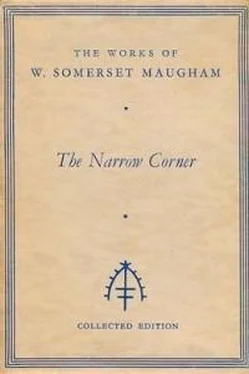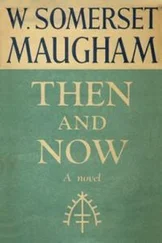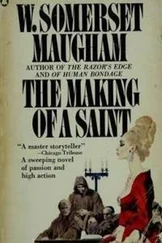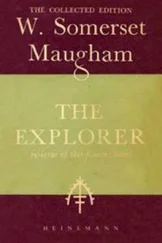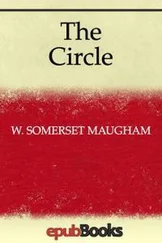“Bless you, I never ’ave dyspepsia when there’s a bit of a gale. Like a tonic to me, it is.”
“How long is this blasted wind going to blow?”
“Not likin’ it much, doc?” The skipper chuckled slyly. “It may drop towards sunset or it may blow up a bit.”
“Can’t we get in the shelter of some island?”
“Better off at sea. These boats, they can stand anythin’. I don’t fancy goin’ to pieces on a reef.”
When they had finished eating Captain Nichols lit his pipe.
“What about a game of cribbage, Fred?” he said.
“I’m on.”
“You’re not going to play that damned game now?” cried the doctor.
Captain Nichols gave the sea a sneering glance.
“A little bit of water; that’s nothin’. Them niggers, they can steer a boat with anyone.”
They went down into the cabin. Dr. Saunders stayed on deck and sullenly watched the sea. The afternoon stretched interminably before him. He wondered what Ah Kay was up to and presently he scrambled forwards. Only one of the crew was on deck. The hatch was battened down.
“Where’s my boy?” he asked.
The man pointed to the hold.
“Sleeping. Want to go down?”
He raised the hatch, and the doctor clambered down the companion. A lamp was alight. It was dark and noisome. One blackfellow was sitting on the floor, with nothing on but a loin cloth, mending his trousers; the other and Ah Kay were in their bunks. They were sleeping quietly. But when the doctor lurched up to Ah Kay he woke and gave his master his sweet and friendly smile.
“Feeling all right?”
“Yes.”
“Frightened?”
Ah Kay, smiling again, shook his head.
“Go back to sleep,” said the doctor.
He climbed up the companion and with difficulty pushed up the hatch. The man on deck helped him, and as he came out on deck a sheet of water hit him in the face. His heart sank. He swore and shook his fist at the angry sea.
“Better get below,” said the blackfellow. “Wet up here.”
The doctor shook his head. He stood there clinging to a rope. He wanted human companionship. He knew perfectly well that he was the only man on board who was afraid. Even Ah Kay, who knew no more of the sea than he, was unconcerned. There was no danger. They were as safe on the lugger as on dry land, and yet he could not prevent the pang of terror that seized him each time that a following wave caught them up and sent a cloud of spoon–drift hurtling along the deck. The water flowed out of the scuppers in a great rush. He was terrified. It seemed to him that it was only by an effort of will that he did not curl up in a corner and whimper. He had an instinct to appeal for succour to a God he did not believe in, and he had to clench his teeth to prevent his trembling lips from uttering a prayer. The circumstance seemed to him ironical that he, an intelligent man, who looked upon himself as something of a philosopher, should be affected with this craven fear, and he smiled grimly at the absurdity. It was a bit thick, if you came to think of it, that he, with his quick brain, his wide knowledge and reasoned view of life, he who had nothing to lose by death, should tremble while these men, ignorant like the blackfellow by his side, base like the captain or dull like Fred Blake, should remain unperturbed. It just showed what a poor thing the mind was. He felt sick with fright, and he asked himself what it was he was frightened of. Death? He had faced death before. Once indeed he had decided to make an end of himself, but painlessly, and it had needed an odd mixture of courage, cynicism and cold reason to make him go on with a life that seemed to offer nothing desirable. He was glad now that he had had the sense. But he knew that he had no great attachment to life. Sometimes when ill he had felt his hold on it so slight that he looked forward to dissolution not only with resignation but with cheerfulness. Pain? He bore pain pretty well. After all, if you could bear dengue or a bad toothache with serenity, you could bear anything. No, it was not that, it was just some instinct over which he had no control; and he looked curiously, as though it were something outside himself, at the terror that made his throat dry and his knees shake.
“Very odd,” he muttered as he made his way aft.
He glanced at his wrist–watch. By God, it was only three. There was something horrible in that clean, wind–swept sky. Its brilliance was heartless. It seemed to have nothing to do with the tempestuous sea; and the sea, so hard and bright a blue, recked nothing of man. Strange, senseless powers that sported with him and destroyed him not from malice, but in wanton amusement.
“Give me the sea from the beach,” the doctor muttered to himself grimly.
He went down into the cabin.
“Two for his ’eels at all events,” he heard from the skipper.
They were still playing their dreary game.
“How’s the weather, doc?”
“Rotten.”
“It’ll ’ave to be worse before it’s better, like a woman ’avin’ a baby. Grand boats these are. Weather a hurricane. I’d rather go to sea in one of these Australian pearlin’ luggers than in a transatlantic liner.”
“It’s your crib,” said Fred.
They were playing on the captain’s mattress, and the doctor, changing his dripping clothes, flung himself on the other. He could not read in the fitful light of the swaying lamp. He lay and listened to the monotonous terms of the game. They struck the ear with an insistent jar. The cabin creaked and groaned and over his head the wind roared furiously. He was shaken from side to side.
“That was a roll,” said Fred.
“Takin’ it grand, ain’t she? Fifteen two. Fifteen four.”
Fred was winning again and the skipper played to a running accompaniment of complaint. Dr. Saunders stiffened his limbs to bear the misery of his fear. The hours passed with frightful slowness. Towards sunset Captain Nichols went on deck.
“Blowin’ up a bit,” he said, when he came down again. “I’m goin’ to ’ave a nap. It don’t look to me as if I’d get much sleep to–night.”
“Why don’t you lay her to?” asked Fred.
“Bring ’er up to the wind with a sea like this runnin’? No, sir. She’s all right as long as everythin’ ’olds.”
He coiled himself up on his mattress and in five minutes was snoring peacefully. Fred went on deck to get a breath of air. The doctor was angry with himself for having been such a fool as to take a passage on this small craft, and he was angry with the captain and with Fred because they were free of the terror that obsessed him. But when the ketch had seemed about to founder a hundred times, and each time righted herself, there stole upon him gradually an unwilling admiration for the gallant little boat. At seven the cook brought them their supper and woke Captain Nichols to eat it. He had been able to make a fire, and they had hot stew and hot tea. Then the three of them went on deck and the skipper took the helm. It was a clear night, with the stars in their myriads twinkling brightly; the sea was rough, and in the darkness the waves looked enormous.
“By God, there’s a big ’un,” cried Fred.
A huge wall of green water, with a breaking crest, was rushing down on them. It looked as though it must inevitably fall on them, and if it did, the Fenton , powerless to rise to it, must be rolled over and over. The skipper glanced round and jammed himself against the wheel. He steered so that the wave should strike them dead aft. Suddenly the stern slewed off the course and there was a crash and a mass of water swept over the quarter. They were blinded. Then the bulwarks rose above the sea. The Fenton shook herself like a dog stepping on to dry land and the water poured out of the scuppers.
Читать дальше
Конец ознакомительного отрывка
Купить книгу
